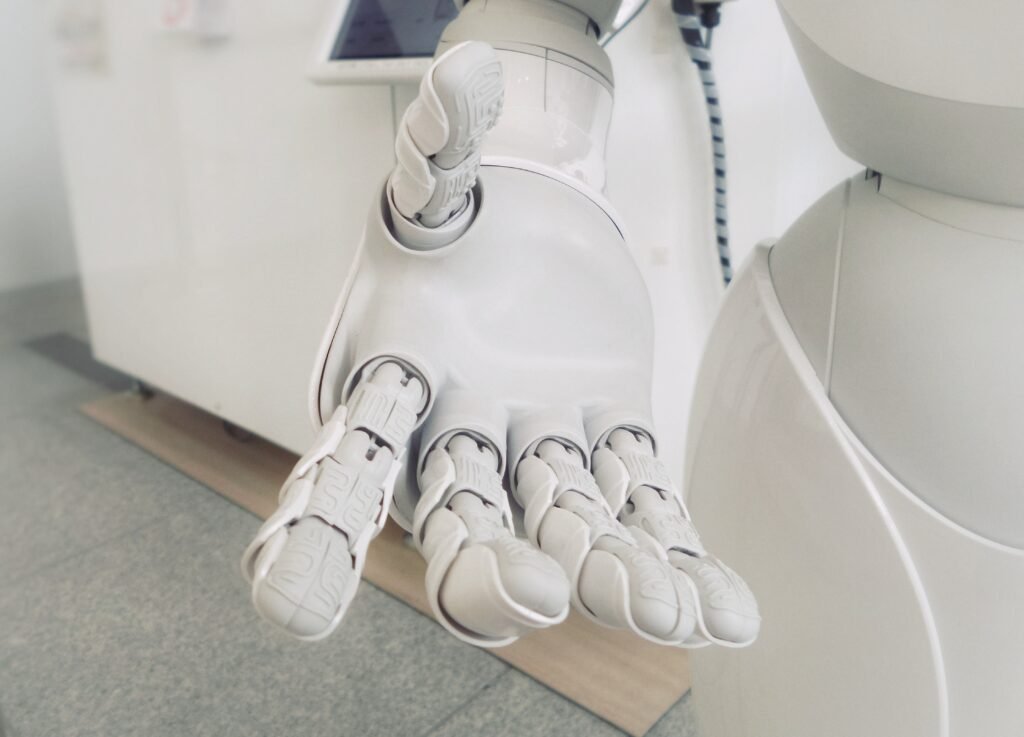Artificial Intelligence, commonly known as AI, is a fascinating field that revolves around the creation and development of intelligent machines, which can perform tasks that would typically require human intelligence. It involves designing computers and systems with the ability to learn, reason, and self-correct, enabling them to understand, interpret, and respond to human language. From autonomous vehicles to voice assistants, AI has quickly become an integral part of our lives, shaping the way we interact with technology. In this article, we will explore the concept of artificial intelligence, unravel its mysteries, and gain a deeper understanding of its applications in various industries. So, buckle up and embark on a journey to demystify the marvels of AI!

Definition of Artificial Intelligence
The concept of artificial intelligence
Artificial Intelligence, also known as AI, refers to the development and implementation of computer systems that can perform tasks that typically require human intelligence. The concept behind AI revolves around creating machines that have the ability to perceive, reason, learn, and solve problems in a way that simulates human intelligence. This involves the utilization of various technologies such as machine learning, natural language processing, expert systems, and robotics, which enable machines to imitate human-like cognitive processes.
The development of artificial intelligence
The development of artificial intelligence has been a result of extensive research, innovation, and technological advancements. The field of AI has evolved significantly over the years, with scientists and researchers continuously exploring new methods and techniques to enhance the capabilities of AI systems. From its early beginnings to the emergence of AI as a distinct field, the development of AI has witnessed breakthroughs and advancements that have propelled its growth and potential.
Types of Artificial Intelligence
Narrow AI (Weak AI)
Narrow AI, also known as Weak AI, refers to AI systems that are designed to perform a specific task or a set of specific tasks. These AI systems are focused on narrow domains and are programmed to excel in those specific areas. Examples of narrow AI include voice assistants like Apple’s Siri or Amazon’s Alexa, which are designed to understand and respond to specific voice commands or perform particular tasks like answering questions or managing smart home devices.
General AI (Strong AI)
General AI, also known as Strong AI, refers to AI systems that possess the ability to understand, learn, and perform any intellectual task that a human being can do. Unlike narrow AI, general AI is not limited to specific domains or tasks and has the potential to exhibit human-like cognitive abilities across a wide range of activities. General AI aims to replicate human-level intelligence, enabling machines to think, reason, and solve problems across various domains.
Superintelligent AI
Superintelligent AI is a hypothetical concept that refers to AI systems that surpass human intelligence in every aspect. These AI systems would have the ability to outperform humans in virtually any intellectual task, making them significantly more advanced and capable than human beings. Superintelligent AI is an area of intense research and debate within the field of AI, with experts exploring the potential benefits and risks associated with such a technologically advanced and powerful form of artificial intelligence.
History of Artificial Intelligence
Early beginnings
The foundations of artificial intelligence can be traced back to the mid-20th century. In the late 1950s and early 1960s, the concept of AI began to gain traction, as researchers and scientists sought to develop machines that could mimic human intelligence. Early pioneers such as Alan Turing and John McCarthy played a crucial role in laying the groundwork for AI through their theoretical frameworks and development of AI programming languages.
The emergence of AI as a field
The 1956 Dartmouth Conference marked a significant milestone in the emergence of AI as a distinct field. At this conference, researchers gathered to discuss and brainstorm ideas related to AI, sparking increased interest and investment in the field. From this point onwards, AI started to gain recognition and funding, leading to the establishment of specialized AI research institutions and the development of AI-specific technologies and methodologies.
Breakthroughs and advancements
Over the years, AI has witnessed significant breakthroughs and advancements that have shaped its trajectory. In the 1990s, machine learning techniques gained prominence, enabling computers to learn from data and improve their performance over time. This opened up new possibilities for AI applications in areas such as natural language processing, computer vision, and pattern recognition.
In recent years, advancements in deep learning algorithms have revolutionized the field of AI, allowing machines to analyze complex data, recognize patterns, and make intelligent decisions with remarkable accuracy. Additionally, the increasing availability of big data and powerful computing resources has further fueled the development and application of AI across various industries and sectors.
The Components of Artificial Intelligence
Machine Learning
Machine Learning is a fundamental component of artificial intelligence that enables computers to learn from data and improve their performance without being explicitly programmed. It involves the development of algorithms and models that can analyze data, identify patterns, and make predictions or decisions based on the learned patterns. Machine Learning is widely used in various applications, including image and speech recognition, recommendation systems, and predictive analytics.
Natural Language Processing
Natural Language Processing (NLP) focuses on enabling computers to understand, interpret, and generate human language. It involves the development of algorithms and models that can process and analyze text or speech data, enabling machines to extract meaning, respond to queries, and generate human-like language. NLP plays a crucial role in applications such as virtual assistants, chatbots, and language translation systems.
Expert Systems
Expert Systems, also known as knowledge-based systems, are AI systems that utilize knowledge bases and rule sets to simulate the expertise of human specialists in specific domains. These systems are designed to solve complex problems by reasoning and making decisions based on their knowledge and rules. Expert Systems have been employed in various fields, including medicine, finance, and engineering, where they provide valuable insights and decision support to professionals.
Robotics
Robotics is a branch of AI that focuses on the design, construction, and operation of robots. AI-powered robots are equipped with sensors, actuators, and intelligent control systems that enable them to perceive their environment, make decisions, and perform physical tasks with precision and efficiency. Robotics has been widely applied in industries such as manufacturing, healthcare, and logistics, where robots can automate repetitive tasks, assist in complex surgeries, or perform hazardous activities.

Applications of Artificial Intelligence
Machine Learning in Healthcare
AI technologies, particularly machine learning, have found extensive applications in the healthcare industry. These applications range from diagnosing diseases, predicting medical outcomes, identifying potential drug targets, analyzing medical images, and assisting in patient care. Machine learning algorithms can analyze large volumes of patient data to detect patterns and correlations, empowering healthcare providers with valuable insights for personalized treatment and improving overall patient outcomes.
Natural Language Processing in Virtual Assistants
Virtual Assistants, powered by natural language processing algorithms, have become increasingly popular in recent years. These assistants, such as Apple’s Siri, Google Assistant, or Amazon’s Alexa, can understand and respond to voice commands, perform tasks like setting reminders, answering questions, playing music, or controlling smart home devices. Natural language processing enables virtual assistants to interpret and generate human-like language, providing users with a more intuitive and interactive experience.
Expert Systems in Business
Expert systems have been widely implemented in various business domains to support decision-making and optimize operational processes. For example, in finance, expert systems can analyze market data, identify investment opportunities, and provide recommendations to traders or investors. In customer support, expert systems can analyze customer queries, suggest solutions, and guide support agents in providing accurate and timely assistance. Expert systems enhance efficiency and accuracy by leveraging domain-specific knowledge and delivering precise answers or solutions to complex problems.
Robotics in Manufacturing
Artificial intelligence-powered robots have revolutionized the manufacturing industry. Robotic automation has enabled manufacturers to streamline production processes, increase productivity, and improve product quality. Robots equipped with AI capabilities can perform repetitive or dangerous tasks with precision and consistency, resulting in higher efficiency and reduced risks to human workers. Additionally, AI-powered robots can adapt to changing conditions and optimize production lines, enhancing flexibility and agility in manufacturing operations.
Ethical Considerations in Artificial Intelligence
Bias in AI algorithms
One of the ethical considerations in artificial intelligence is the potential for bias in AI algorithms. AI systems learn from data, and if that data contains biases, the AI system may replicate or amplify those biases, leading to unfair or discriminatory outcomes. For example, biased training data in facial recognition systems could result in misidentifications or unequal treatment based on race or gender. Addressing bias requires careful data selection, measurement, and ongoing monitoring to ensure fairness and equity in AI applications.
Privacy and data security
Artificial intelligence heavily relies on data, particularly personal data, to train and make decisions. This reliance raises concerns about privacy and data security. It is crucial to ensure that AI systems are designed and implemented with appropriate privacy safeguards to protect individuals’ personal information. This includes obtaining informed consent, securely storing and processing data, and implementing robust security measures to prevent unauthorized access or breaches.
Job displacement
The increasing adoption of AI and automation technologies has raised concerns about job displacement and the potential impact on the workforce. While AI systems can automate routine and repetitive tasks, leading to increased efficiency and productivity, they may also result in job losses in certain sectors. As AI continues to advance, it is important to consider retraining and reskilling initiatives to help individuals transition into new roles and industries that require higher-level skills, creativity, and human interaction.

Benefits and Limitations of Artificial Intelligence
Advantages of AI
Artificial intelligence offers numerous benefits across various domains. AI-powered systems can enhance efficiency, accuracy, and productivity, leading to cost savings and improved outcomes in industries such as healthcare, manufacturing, and finance. AI can also augment human capabilities, enabling professionals to make more informed decisions and focus on complex tasks that require higher-level cognitive abilities. Additionally, AI has the potential to drive innovation, solve complex problems, and contribute to scientific advancements in areas such as drug discovery, climate modeling, and space exploration.
Challenges and limitations of AI
Despite its significant potential, artificial intelligence also faces several challenges and limitations. AI systems heavily rely on data availability and quality, which can present challenges if data is limited, biased, or incomplete. Ensuring data privacy, security, and ethical use of AI presents ongoing challenges that need to be addressed through proper regulations and guidelines. Furthermore, the complexity and interpretability of AI algorithms raise concerns about the accountability, transparency, and potential unintended consequences of AI decision-making.
AI in Popular Culture
Depictions in Movies and TV Shows
Artificial intelligence has been a popular theme in movies and TV shows, often portraying both the utopian possibilities and dystopian risks associated with AI. Movies like “2001: A Space Odyssey,” “Ex Machina,” and “The Matrix” explore the ethical and existential questions surrounding AI, while TV shows like “Black Mirror” dive into the potential societal impacts of advanced technologies, including AI. These depictions offer a reflection of society’s fascination and apprehension towards AI and its implications.
AI in Literature
Artificial intelligence has also found a significant presence in literature. Books such as Isaac Asimov’s “I, Robot,” Philip K. Dick’s “Do Androids Dream of Electric Sheep?,” and William Gibson’s “Neuromancer” delve into the ethical, philosophical, and social aspects of AI. These literary works often explore the blurred boundaries between humans and machines and challenge our understanding of consciousness, identity, and morality in a world permeated by advanced AI.
AI in Video Games
AI plays a vital role in the world of video games, where it is used to create intelligent non-player characters (NPCs) and enhance game mechanics. NPCs with AI capabilities can exhibit human-like behaviors, making gameplay more immersive and challenging. AI algorithms in video games govern character movements, decision-making, and strategic planning, adding depth and complexity to the gaming experience. As technology advances, AI is expected to further revolutionize the gaming industry, offering more realistic and engaging virtual worlds.
Current Trends and Future Outlook
Industry trends
In recent years, several key trends have shaped the landscape of artificial intelligence. One of the major trends is the integration of AI in various industries and sectors, with organizations leveraging AI technologies to automate processes, optimize operations, and deliver personalized experiences. Another trend is the increasing adoption of AI-powered virtual assistants and chatbots in customer service, improving customer engagement and satisfaction. Additionally, AI is making significant strides in healthcare, with applications ranging from diagnosis and treatment recommendation to proactive patient monitoring.
Predictions for the future of AI
The future of artificial intelligence holds immense potential and exciting possibilities. Experts predict that AI will continue to advance, with further breakthroughs in areas such as natural language processing, computer vision, and reinforcement learning. AI is expected to have a significant impact on job roles, leading to a transformation of the labor market and the need for new skill sets. Furthermore, as AI becomes more integrated into society, ethical considerations, regulation, and governance of AI are likely to become even more crucial.
Conclusion
Artificial intelligence has come a long way since its early beginnings and has become an integral part of our lives. Its ability to imitate and augment human intelligence has led to numerous advancements and innovations across various industries and domains. From narrow AI systems performing specific tasks to the potential of General AI and Superintelligent AI, the possibilities are vast. While AI offers numerous benefits, it also presents ethical considerations and challenges that require careful thought and regulation. As AI continues to evolve and shape our world, it is important to nurture its potentials while ensuring its responsible and ethical implementation.





